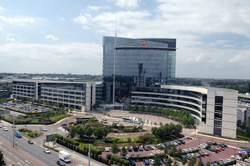GlaxoSmithKline ($GSK) CEO Andrew Witty may be heading for the door next year--but he's still touting the strategy he put in place there, and he believes it won't be following him out.
 |
| GSK CEO Andrew Witty |
"The board of GSK feels very strongly that the strategy is right for the environment we perceive to be developing around us," he said last week, as quoted by Bloomberg.
That strategy involves hanging onto Glaxo's component parts, despite pressure from high-profile investors--such as the U.K.'s Neil Woodford--to split apart. Witty has advocated for waiting, particularly with the company's recently expanded OTC unit, whose operating margin he believes is primed for a turnaround.
"We're talking about a big, big business, with a significant capacity to produce value for shareholders," Witty told the news service. "And what I've shown--and what I think the company has shown--is that we've got a terrific track record of passing that value directly to shareholders in dividend payments."
Witty's critics haven't been thrilled with the OTC focus in general, and they've been vocal ever since Glaxo swapped its cancer assets to Novartis ($NVS) to home in on less pricey products, such as vaccines, that wouldn't face the kind of payer pressure that's hammered lead med Advair. Many, including Woodford, would be happy to see the scaled-up consumer unit jettisoned, arguing that there's value at the company that hasn't yet been unlocked.
 |
| GSK's headquarters in London |
Businesses like the OTC division "go for very high multiples, simply because they offer steady growth almost into perpetuity," Royal London Asset Management fund manager Joe Walters told Bloomberg.
But so far, it looks as if those split-minded investors may not get their wish--even after the departure of Witty, who revealed last week that he'd be stepping down early next year. With that announcement, Chairman Philip Hampton said in a statement that the company would "[ensure] the group remains focused on execution of its strategy."
And as Deutsche Bank analysts recently noted, without consumer health, the British drugmaker would be more dependent than ever on its floundering pharma business--unless, of course, it pulled off a "transformational deal" to help patch up the Advair wound.
"It seems to us more likely that any new strategy will represent an evolution on the company's current direction rather than a major change," they said.
- get more from Bloomberg
Special Reports: The top 15 companies by 2014 revenue - GlaxoSmithKline | Pharma's top 10 M&A deals of 2014 - GlaxoSmithKline Oncology/Novartis Vaccines